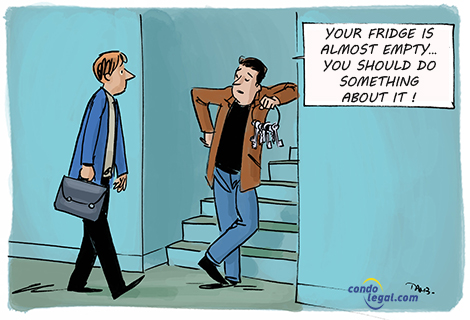Date published: 11/03/2024
Delivery of a duplicate of the keys

Section 7 of the Charter of human rights and freedoms guarantees the inviolability of a person's home. In principle, no one may have access to a co-owner's apartment without his or her consent; however, it has been rightfully ruled that this rule is not absolute and this is why most declarations of co-ownership specify that a co-owner, a lessee (tenant) or any other occupant of the immovable must leave at all times a duplicate set of keys to the board of directors or to the person mandated to preserve the keys. For instance, in the event of emergency work, co-owners are required to allow a representative of the syndicate free access to their private portions.
Right with limitations
The declaration of co-ownership generally stipulates that any co-owner, lessee (tenant) or occupant must leave a duplicate of his keys of his private portion to the syndicate; it is also specified that the holder of the duplicate of keys is only allowed to enter the private portion under certain situations such as in the case of a fire or if it is necessary to intervene urgently following a ruptured pipe, an electrical circuit failure or that of the other piping and wiring, a broken window, a water damage, infiltration or flooding. With that being said, the Superior Court of Québec ruled that this did not violate the Charter of human rights and freedoms (C.h.r.f.) regarding the right to the enjoyment of property (section 6 C.h.r.f.) and the inviolability of a person's home (sections 7 and 8 C.h.r.f.) basing its decision on sections 1062 and 1066 of the Civil Code of Québec.
However, unless having informed the co-owner within the delays specified in the declaration of co-ownership and that the latter has given his or her consent if it is required, the directors can't enter the apartment without a valid reason. For example, it would be illegal to enter the co-owner's residential unit without warning him or her for a reason based on mere suspicion such as to inspect work that would have been undertaken without the syndicate’s authorization.
Alarm system
Furthermore, the declaration of co-ownership usually mentions that if the residential unit is equipped with an alarm system, the access code must be disclosed to the directors because by failing to do so, a syndicate can't be blamed for triggering the alarm system; the concerned co-owner would therefore assume the resulting repair costs as well as any other related invoice. It should be noted that several municipal regulations contain a fine for any false alarm on account of the police being called to the scene.
Delinquency
Unfortunately, the provisions included in the declaration of co-ownership regarding the duplicate of keys and the alarm system are not always respected. In the case of an emergency, the syndicate can therefore find itself in a difficult position if it does not have the key to the residential unit in which an urgent intervention is required; it's recommended to call the fire department of the concerned municipality.
 WHAT YOU SHOULD KNOW! In the case of a fire or a water damage, it's better to have the keys to the apartment to be able to enter it rather than resorting to the services of the firefighters who will break the door; similarly, in the case of the keys being lost, the co-owner or the occupant may find it advantageous to borrow those held by the syndicate rather than using a locksmith.
WHAT YOU SHOULD KNOW! In the case of a fire or a water damage, it's better to have the keys to the apartment to be able to enter it rather than resorting to the services of the firefighters who will break the door; similarly, in the case of the keys being lost, the co-owner or the occupant may find it advantageous to borrow those held by the syndicate rather than using a locksmith.
 WHAT TO KEEP IN MIND: It is not forbidden for a syndicate to have a duplicate of the keys to a co-owner's apartment; however, its representatives are authorized to enter the private portion only in the event of an emergency resulting from but not limited to a fire, broken pipes, broken electrical circuits, broken windows or glass or water infiltration caused by flooding or otherwise.
WHAT TO KEEP IN MIND: It is not forbidden for a syndicate to have a duplicate of the keys to a co-owner's apartment; however, its representatives are authorized to enter the private portion only in the event of an emergency resulting from but not limited to a fire, broken pipes, broken electrical circuits, broken windows or glass or water infiltration caused by flooding or otherwise.
 WARNING! The co-owner who refuses to hand over the key of his private portion to the syndicate may incur civil liability; it may be liable for damages resulting from an inability to quickly enter his residential unit.
WARNING! The co-owner who refuses to hand over the key of his private portion to the syndicate may incur civil liability; it may be liable for damages resulting from an inability to quickly enter his residential unit.
Back to the factsheet: Water damages